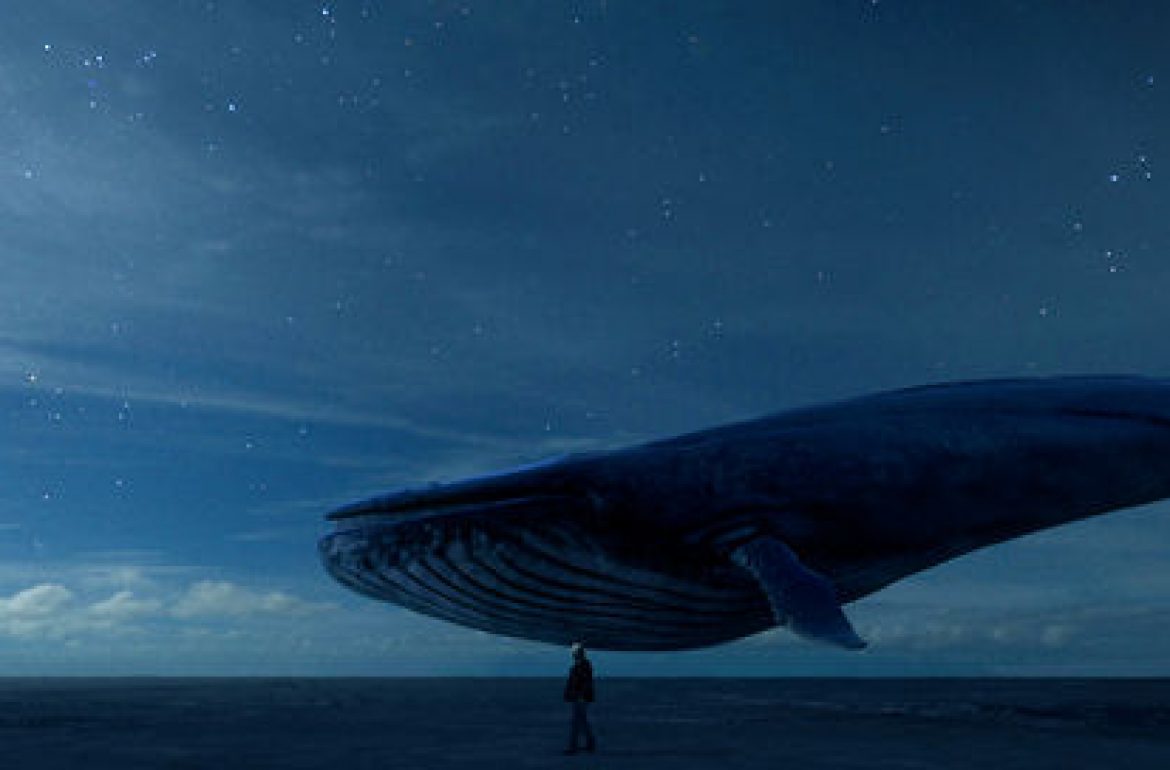His motions plainly denoted his extreme exhaustion. In most land animals there are certain valves or flood-gates in many of their veins, whereby when wounded, the blood is in some degree at least instantly shut off in certain directions. Not so with the whale; one of whose peculiarities it is to have an entire non-valvular structure of the blood-vessels, so that when pierced even by so small a point as a harpoon, a deadly drain is at once begun upon his whole arterial system; and when this is heightened by the extraordinary pressure of water at a great distance below the surface, his life may be said to pour from him in incessant streams. Yet so vast is the quantity of blood in him, and so distant and numerous its interior fountains, that he will keep thus bleeding and bleeding for a considerable period; even as in a drought a river will flow, whose source is in the well-springs of far-off and undiscernible hills. Even now, when the boats pulled upon this whale, and perilously drew over his swaying flukes, and the lances were darted into him, they were followed by steady jets from the new made wound, which kept continually playing, while the natural spout-hole in his head was only at intervals, however rapid, sending its affrighted moisture into the air. From this last vent no blood yet came, because no vital part of him had thus far been struck. His life, as they significantly call it, was untouched. As the boats now more closely surrounded him, the whole upper part of his form, with much of it that is ordinarily submerged, was plainly revealed. His eyes, or rather the places where his eyes had been, were beheld. As strange misgrown masses gather in the knot-holes of the noblest oaks when prostrate, so from the points which the whale’s eyes had once occupied, now protruded blind bulbs, horribly pitiable to see. But pity there was none. For all his old age, and his one arm, and his blind eyes, he must die the death and be murdered, in order to light the gay bridals and other merry-makings of men, and also to illuminate the solemn churches that preach unconditional inoffensiveness by all to all. Still rolling in his blood, at last he partially disclosed a strangely discoloured bunch or protuberance, the size of a bushel, low down on the flank. «A nice spot,» cried Flask; «just let me prick him there once.» «Avast!» cried Starbuck, «there’s no need of that!» But humane Starbuck was too late. At the instant of the dart an ulcerous jet shot from this cruel wound, and goaded by it into more than sufferable anguish, the whale now spouting thick blood, with swift fury blindly darted at the craft, bespattering them and their glorying crews all over with showers of gore, capsizing Flask’s boat and marring the bows. It was his death stroke. For, by this time, so spent was he by loss of blood, that he helplessly rolled away from the wreck he had made; lay panting on his side, impotently flapped with his stumped fin, then over and over slowly revolved like a waning world; turned up the white secrets of his belly; lay like a log, and died. It was most piteous, that last expiring spout. As when by unseen hands the water is gradually drawn off from some mighty fountain, and with half-stifled melancholy gurglings the spray-column lowers and lowers to the ground—so the last long dying spout of the whale. Soon, while the crews were awaiting the arrival of the ship, the body showed symptoms of sinking with all its treasures unrifled. Immediately, by Starbuck’s orders, lines were secured to it at different points, so that ere long every boat was a buoy; the sunken whale being suspended a few inches beneath them by the cords. By very heedful management, when the ship drew nigh, the whale was transferred to her side, and was strongly secured there by the stiffest fluke-chains, for it was plain that unless artificially upheld, the body would at once sink to the bottom. It so chanced that almost upon first cutting into him with the spade, the entire length of a corroded harpoon was found imbedded in his flesh, on the lower part of the bunch before described. But as the stumps of harpoons are frequently found in the dead bodies of captured whales, with the flesh perfectly healed around them, and no prominence of any kind to denote their place; therefore, there must needs have been some other unknown reason in the present case fully to account for the ulceration alluded to. But still more curious was the fact of a lance-head of stone being found in him, not far from the buried iron, the flesh perfectly firm about it. Who had darted that stone lance? And when? It might have been darted by some Nor’ West Indian long before America was discovered.

